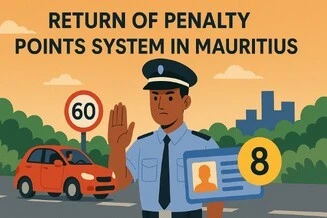Government Defends New Vehicle Measures as Opposition Demands Clarity

In the latest parliamentary session on 30 June 2025, Opposition Leader Joe Lesjongard raised a Private Notice Question directed at the Minister of Land Transport, Osman Mahomed. The focus was on the recently announced measures in the 2025-26 Budget aimed at reducing the number of vehicles on Mauritian roads. The new fiscal measures, which come into effect in July 2025, include revisions to excise duties, customs charges, vehicle registration fees and the Road Motor Vehicle Licence. These changes are expected to increase the cost of vehicle ownership, a move the government says is necessary to tackle persistent road congestion. Ahead of the policy rollout, Mauritians rushed to register vehicles before the new levies kicked in. In June alone, 7,304 vehicles were sold, setting a new monthly record. From January to June 2025, 22,893 vehicles were registered with the National Land Transport Authority (NLTA), averaging nearly 200 per day. This included nearly 2,500 reconditioned vehicles sold within three weeks, driven largely by panic buying in response to the 2025-26 Budget. The president of the Dealers in Imported Vehicles Association, Zaid Ameer, noted that the surge was not a sign of healthy market demand but a reaction to sudden policy changes. The result has been logistical challenges for both buyers and sellers, with the industry experiencing three weeks of disruption since the budget announcement. Addressing the question of preparatory work, Mahomed stated that the government did not rely on consultancy reports to back the new measures. In his view, the situation on the roads speaks for itself. Rising traffic congestion, an increase in road accidents and growing frustration among drivers were described as obvious and urgent issues that required action. He argued that the evidence is visible daily and that further studies would not add meaningful value. Between 2014 and 2025, the number of vehicles in circulation rose from 465,000 to 733,000, a 58% increase. This growth has continued despite major investments like the Metro Express. Mahomed referred to this as “uncontrollable” and cited it as the main reason for budgetary action. He emphasised that the objective is to slow growth, not reduce the number of vehicles already on the road. From 1 July, registration duties for new and reconditioned vehicles will increase by 30%. Excise duties on petrol and diesel vehicles will rise to between 45% and 100%. All incentives for electric vehicles have been scrapped, including the Rs200,000 cashback. Hybrid and EV taxes were reinstated from 6 June, with popular models like the Yaris Cross becoming significantly more expensive. According to Ameer, this signals that environmentally friendly choices are becoming a luxury. The increased financial burden is being felt across all segments of society. Taxi drivers, for example, have seen Road Motor Vehicle Licence fees jump from Rs900 to Rs2,400 for 1600cc vehicles. Many are passing on the cost to passengers. Small car rental firms are freezing expansion plans and adjusting their prices to absorb the impact. While the minister’s response indicates a firm stance on moving forward without extensive external analysis, the opposition’s intervention reflects public concerns about the lack of transparency and consultation. With road congestion becoming an everyday frustration for many Mauritians, and vehicle ownership continuing to rise ahead of the upcoming cost increases in July, the government’s strategy will likely remain a hot topic in the months to come. There are also growing calls for clarity on how revenue from increased road taxes is being spent. Despite claims that these funds are used for road maintenance, the condition of many roads remains poor, and large-scale projects continue to rely on international loans. At AutoCloud, we’re keeping a close eye on how these policy shifts will shape demand, pricing, and the overall dynamics of the automotive market in Mauritius. The months ahead will reveal whether the proposed changes can deliver meaningful relief on our roads or whether a broader rethink of transport planning is needed.Record Sales Ahead of Policy Changes
Minister Rejects Need for Formal Studies
Budget Impact Across the Board
Public Sentiment and Policy Direction
More Articles
![Will Penalty Points Make Mauritius’ Roads Safer This Time?]()
Will Penalty Points Make Mauritius’ Roads Safer This Time?
Mauritius is getting serious about road safety. With road deaths climbing and dangerous driving becoming all too common, the government ...Read more![Increased Police Presence for Mauritius Over the Festive Season]()
Increased Police Presence for Mauritius Over the Festive Season
A clear message for safer roads in MauritiusMauritius is heading into the festive season under tighter road surveillance, and the ...Read more![Road Works on the Black River–Savanne Coastal Road: What Commuters Need to Know]()
Road Works on the Black River–Savanne Coastal Road: What ...
If you travel along the scenic stretch between Rivière Noire village and Bel Ombre, expect some light disruptions over the ...Read more



